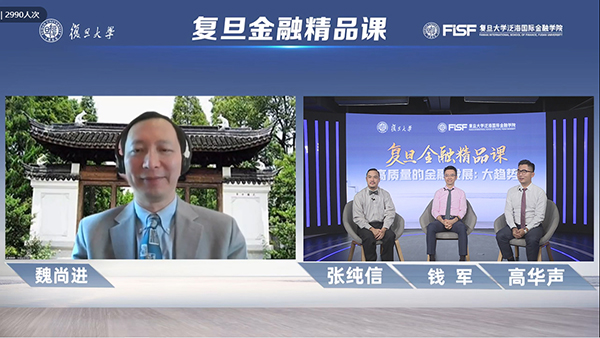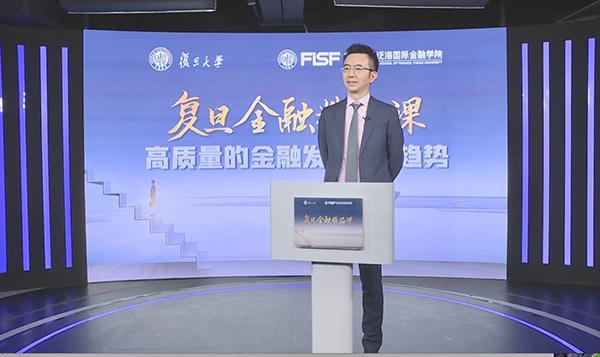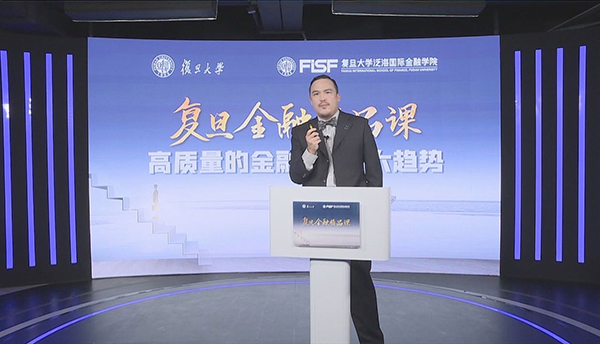Top Teaching Faculty at FISF Gathered at Closing Course, Discuss General Trend of High-quality Financial Development
发布时间:2021-10-15

On
September 24th 2021, the online series course of “2021 Fudan
Financial Course” launched by FISF concluded successfully. Professor Jun Qian, Executive Dean of FISF, Professor Charles
Zhang, Deputy Dean of Academics, and Professor Huangsheng Gao, Deputy Dean of
Faculty and Research, gathered on the cloud to conduct in-depth dialogues with
Professor Shang-Jin Wei, Academic Visiting Professor of Finance and Economics
at Fanhai International School of Finance (FISF), and Professor of Finance and
Economics at Columbia University on the topic of “High-quality Financial
Development: General Trend”. Starting
from their respective fields of research, the
four top professors in finance at FISF made forward-looking analysis
on the financial system in China from perspectives of debt issues, fintech,
reform of the capital market and etc, presenting an engaging forum for
students.
At
the beginning of the course, Professor Jun Qian first gave a heavyweight
sharing entitled “‘Dark Rhino’
in China’s Finance Industry in 2021: Debt Issues, Risk Conduction and
Resolution”. He came straight to the point that the “Dark Rhino” in China’s
financial system was a debt issue mainly represented in the high debt rate of
certain local governments and non-financial industries. According to various plates of the
society, the highest debts lie in non-financial industries, also called the
real economy; according to various industries, the real estate industry is
among those with the highest debt rate. As for the route of debt risk
conduction, Qian analyzed that currently the concentrated outbreak of debt
risks are mainly manifested concentrated debt maturity default of one or
multiple large enterprises, which may cause a sharp increase in the bad debt
rate of banks within a short time. The default risk will be deteriorated if
bank runs appear in other high-debt enterprises closely related with the
defaulting enterprises. Therefore, he stressed that the critical point to
resolve the risk of debt issues is to cut off the conduction route of risks
among financial institutions so that the bank running risks with creditors can
be avoided.

Next, Professor Charles Zhang gave an in-depth analysis,
entitled “Fintech Opening Private Equity Market”, on the equity financing mode
reform brought by fintech. He first
pointed that at present many large enterprises in the US no longer need to list
in the public market to finance. Instead, substantial financing can be achieved
through channels of private placements. Taking the equity trading system for
example, enterprises don’t need to list to disclose information on an open
trading platform. When investors see such a more liquid and profound
information disclosure, the enterprise evaluation will rise accordingly while
the risks can also be resolved. Zhang indicated that the liberalization of
equity transfer can lead to information disclosure, effective regulation and
trade liquidity, promoting the overall listing mechanism to some extent and
building a bridge between the primary market and secondary market. In the
future, it can be taken into consideration to take advantage of blockchain to
establish a platform where the property rights are clearer and the transactions are
more transparent, achieving better protection on investors.

Subsequently, Professor Huasheng Gao gave a speech on
“Exploring Critical Elements for Second Board Stock Market to Succeed from
the Establishment of Beijing Stock Exchange”, talking about the reform process of China’s capital
market. He held that China’s stock exchanges are faced with a dilemma when
formulating the listing standard. A higher listing standard will make it more
difficult for small- and medium-sized enterprises to list on the main board;
while a lower one will lead enterprises below the standard to list on the
second board market, which may cause damage to investors’ interests. In consequence, Gao
emphasized that the critical element for the second board market to succeed is
its protection on small- and medium-sized stockholders. “With enhanced
protection on small- and medium-sized stockholders, there will be lower risks of
damage to their interests and greater desires of investment. Enterprises can
gain more financing and higher evaluations, and a larger number of good
enterprises can be listed. On the contrary, if the protection on small- and
medium-sized stockholders is weakened under the banner of diversified listing
standards, the stockholder interests will be damaged ultimately and good
enterprises will be less likely to be listed.”

In the last stage of the roundtable
dialogue, three professors carried out heated discussions with Professor
Shang-Jin Wei on the topic of capital market construction. Professor
Shang-Jin Wei pointed in his conclusion that China’s equity
financing market is still underdeveloped, and thus in the process of striding
from a middle-income country to a high-income country, the financing of
technological enterprises is even increasingly significant to the development
of the financial market, generating more rigorous requirements on equity
financing, which shall need major support in the future. He specially
mentioned that both digital technology and the public play a key role in the
ecological construction of capital market. In competing with each other, the
major stock exchanges shall try to avoid the result of “bad money driving out
good” by applying lower listing standards. Instead, they should achieve benign
development through diversified competition.
As the groundbreaking online
financial and economic course in China, “2021 Fudan Financial Course”
successively invited 25 top financial teachers, such as Wang Tao, Ba Shusong,
Lin Yifu and Chen Zhiwu, in the past half year to give 25 sessions of live
courses, giving in-depth analysis on macroeconomic trends like the
post-epidemic global economic trends, long-term potential growth rate of
Chinese economy and the future of the globalization of RMB. With great devotion
they have imparted asset allocation concepts of family wealth management,
financial laws and family wealth inheritance design, innovatively deconstructed
fintech and other advanced practice achievements, and carried out mind
expansion on hot topics like economic growth under “carbon neutrality”, making
every effort to help students build
a comprehensive and complete view of finance and realize glorious career
development.